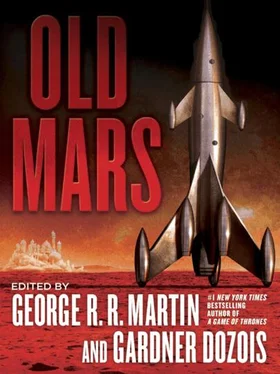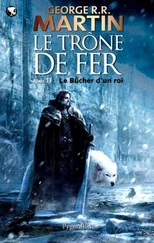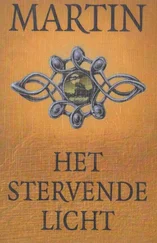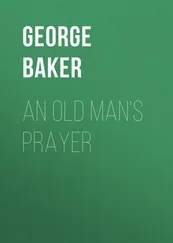Rekari reached into his jacket pocket and pulled out a wad of cloth the size of his fist. “This is what he wished, David. To give this to you.” He unrolled the cloth to expose a pale, teardrop-shaped pebble, smoothly polished, pierced at one end and threaded with a silver chain. Its surface glimmered faintly, like the ghost of an opal, and Dave knew immediately what it was. Its Martian name translated as “sunstone,” and it was traditionally worn by the heads of Martian families and passed down from parent to child, generation after generation. Rekari, who had been head of his family since the death of his father nine years before, wore one, usually tucked inside his shirt. The humans on Mars did not consider sunstones especially attractive, though Dave had always thought Rekari’s was pleasant-looking.
He hadn’t known his father owned one.
Rekari held the stone out to Dave, the chain dangling from his long fingers.
Dave took it and held it close to the lamp. “Where did this come from?”
“Many years ago,” said Rekari, “before you were born, before I became your father’s associate, a child was lost from a Martian town some forty kilometers to the south. Your father had already explored considerably in the area, looking for ruins, and so, knowing the landscape, he volunteered to help in the search. He was, in fact, the only man of Earth who did. And he found the child. But the season was winter, and he was too late. The child had died of the cold. Still, the family was grateful, and the child’s grandfather, who was head of the family, never forgot. For the sake of that child, who had been their only hope of a future, he helped your father over the years, translating inscriptions, telling stories passed down from ancient times, even drawing maps of places that once were but are no more. And some months ago, in the last days of his life, when his family was coming to an end, he called your father to his side and, for the sake of that child, gave him this sunstone so that the family might be carried on, even if by a man of Earth. And it was he who told your father of the place that might have been a city in the old times, because he knew how much your father wanted to find such a city. One more story, of many that your father heard in his years on Mars.
“We went,” said Rekari. “How could we not go? We always went. But this time, all we found was your father’s death. And now you are the head of your family.”
Dave let the stone rest in his cupped palm, thinking about how his father must have worn it, about the old Martian whom he had never met, and about that lost child. He was feeling a bit lost himself. Ben Miller and Sons. He wished he could have shaken his father’s hand one last time, embraced him one last time. He didn’t feel like the head of anything. “Well, there’s Bev,” he said.
“She has joined herself to another family,” said Rekari. “And your father did not mean for her to have the stone. I know you understand that.”
Dave made the sign for agreement. He slipped the chain over his head, then, because it seemed so strange to be a human and wearing a sunstone, and because Rekari wore it that way, he tucked it inside his shirt where no one would see it. “I assume his grave is near the site,” he said. “I wish to visit both.” Cool at first, the stone warmed quickly against his chest, and he could not help feeling oddly comforted by it, as if some tiny part of his father were with him.
Rekari made the sign for sorrow one more time. Then he murmured, “When the new boat is finished, I will take you there. It is a long journey.”
Dave thought about the boat, fresh and sleek-looking, a beautiful pleasure craft, but not for the impatient, and he found that he was very impatient. He calculated how many Earth creds he had left.
More than enough. “I’ll buy a motor for the boat,” he said finally. “Not so long a journey as with a sail.”
Rekari gave him a surprised look. “Have you come home rich?”
“There was money to be earned on Earth, and I spent less than I was paid. I have enough to use for important things.”
Rekari stood. “Then the decision is made. We will go north, you and I. Buy the motor, and I will ready the boat to receive it.” He went to the door, where he turned back for just a moment to make the sign of temporary farewell before walking out into the midday light.
Dave slumped in his father’s chair. He felt drained by their conversation and suddenly overwhelmed by the day’s events. He slid the sunstone from beneath his shirt and curled his hand around it. “You should have told me, Dad,” he whispered, and he shut his eyes hard against the tears that he had not allowed Rekari to see. Going on without his father was something he could barely imagine. They were going to be a team. For two Martian years he had thought about how he would change that sign. “Ben Miller and Son, Archaeology. Tour the Ancient Ruins.” The bold truth. He had planned on painting the new one himself. Ben and Dave Miller were going to find one of those lost cities and revolutionize the human view of the ancient Martian civilization. Oh, he had such plans, with his new-minted Ph.D. He shook the sunstone, as if through it he could shake his father. “Why didn’t you tell me?” And then the real question, “Why did you have to die?”
When the tears finally eased, he wiped his eyes on the shoulder of his shirt. Dragging himself out of the chair, he pushed the front door shut. Rekari had left the lamp, and somehow its greenish glow was comforting, reminding him of his childhood and evenings spent in Rekari’s own home. But he didn’t need its light to find his way around. He left it where it was and staggered into the living quarters and his own bedroom, where he eased himself onto the bed. He turned the thin pillow over and put his head down.
The next thing he knew, someone was ringing the office doorbell, which was hand-operated by twisting a knob and did not rely on the nonexistent utility power. He blinked the sleep from his eyes and sat up. The windows were even darker than before—night had fallen. He lurched off the bed and stumbled to the office, where the lamp had faded almost to nothing. Pulling the flash out of his pocket, he went to the door and pulled it open.
It was Jacky, with her own flash held beside her hip. Behind her, a few soft lights in the buildings across the street were the only other illumination. “Still interested in chicken?” she said.
He blinked a few more times and realized he was very hungry. He nodded.
“Come on over,” she said. “I’ve got beans and tomatoes, too.”
It sounded great. “I’ll be there right away.”
Three other people were gathered for the meal. Dave knew them all—old-timers, friends of his father. He didn’t know if he should tell them his father was dead. He decided he couldn’t face that conversation yet, so instead, they traded some small talk, including some about Earth, then Dave excused himself and paid his bill.
“Going out to help your dad, are you?” Jacky said as she took his creds.
“Where’d you hear that?”
“Rekari’s boy stepped the mast today. That means a launch. Pretty convenient.”
“Well, maybe I’ll go for a sail,” said Dave. “Just to see how things have changed in two years.”
Jacky laughed. “Nothing ever changes here.”
Dave pointed over his shoulder in the general direction of the canal. “There’s the wheat.”
“It’s like the cycle of the seasons,” said Jacky. “It gets a little warmer, the water rises, it gets a little colder and it falls back. There won’t be any wheat.”
Dave shrugged. “Wheat means new settlers, new homes. There’ll be things to see.”
“And lost cities to hunt.” She winked at him and turned to another customer.
Читать дальше












